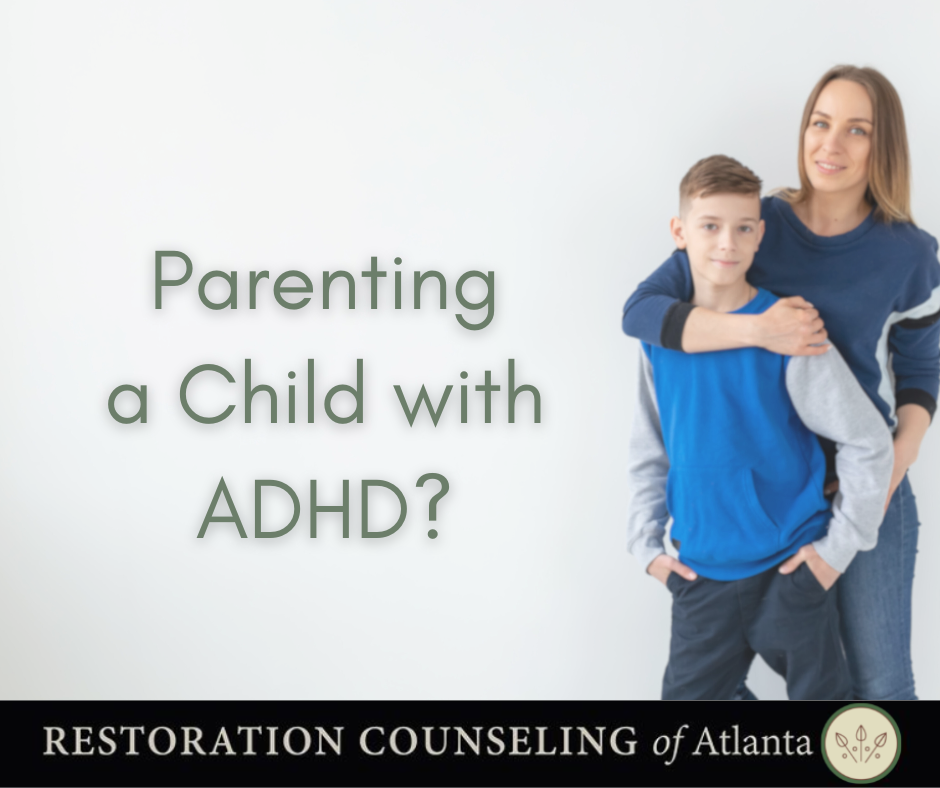You Are The Magic Ingredient!
September means that school is back in full swing! Many parents appreciate the consistency and routine of the school calendar, but this time of year also brings new challenges. For parents of kids with ADHD, this often brings the added stress of managing behaviors and executive functioning skills that are different from their peers. Parents of these kiddos can often feel overwhelmed, frustrated, and self-conscious about how they’re perceived by other parents. I work with many parents in these situations and they are often searching for the best things to help their ADHD child be successful and behave appropriately at home and school. There is one thing that parents can give their ADHDer, which research has proven will consistently improve those outcomes. What is this magical thing? It’s you!
Your Child Needs YOU
There are plenty of strategies that can help support your child with ADHD, but none are as beneficial as you, the parent. Research shows that proper medication and helpful parental involvement are the two most important factors in helping children with ADHD. You, their parent, are the magical ingredient in helping them manage symptoms like outsized impulsivity, emotional dysregulation, and task completion. But let’s be honest about this: supporting kids with these symptoms can be taxing and confusing, especially if you feel like your parenting strategies aren’t working. So, here are a few things your ADHDer needs and how you can help to effectively provide them.
Calm
Kids with ADHD struggle with managing their emotions in developmentally appropriate ways. To understand these kids, we have to remember that their brains do not function in the same way as their peers. Their thoughts often feel scattered and disorganized in their heads. The ability to process information, especially verbal instruction, isn’t always fully developed, and they are often unsure of what they’re supposed to be doing. Their working memory is a liability, so they can be focused on a task but quickly become distracted by something else. Their impulsivity can push them to make a poor choice without considering the consequences to themselves or others. Depending on their prevalence and intensity, these characteristics can often bring negative reactions from authority figures and peers.
Many ADHDers feel a great deal of anxiety and shame about how they handle their environment. ADHD impulsivity can lead children to choose the first emotion they feel (often protective anger), even if it doesn’t help them or the situation. Research is showing that arguments and intense interactions with people with whom ADHDers feel safe actually stimulate parts of their brains that are slowed by their disorder, pumping in dopamine that they crave.
So, What Can You Do?
You can be their calm. You can let them borrow your calm. Often, your ADHDer cannot find the calm they need inside their mind or body. But you, as the adult, can be calm when it’s not easy or when the child is the cause of the chaos. This is very difficult! It’s human nature to be emotionally dysregulated when your child is being loudly defiant, inflexible, or using unkind words toward you. These are the moments when we must remember: “I am what they need and I can be calm even if they cannot.”
Let me be clearer. If your ADHDer sees you becoming dysregulated, it will dysregulate them even more. If they see that you can be calm even when they are not, they have access to that calm from you. Practicing calmness in front of them is what they need. Some of this is practice and “fake it ‘til you make it.” However, we as parents can also see this as a challenge to cultivate real calmness in our hearts and lives. Our children’s behavior does not have to lead us toward dysregulation. That is our responsibility. We can be the calm they need.
Structure
Your ADHDer needs you to help them structure their time. The most prevalent symptom of ADHD is a lack of working memory. This means that they struggle with things like accurately perceiving the passage of time, staying focused on a task until its completion, or remembering homework assignments they’re given. These struggles are accompanied by the various developmental stages that kids normally go through. Parents often struggle to see the difference between normal adolescent difficult behavior and symptoms of ADHD. They need you to help them manage things like getting ready in the morning in a reasonable amount of time, keeping up with school assignments, and developing routines. Being demanding, punishing, or shaming will not help ADHDers in these areas. Often, those things make symptoms worse.
So, What Can You Do?
Parents must remind themselves that their child will not develop those executive functioning skills at the same rate as their peers, so they will need to create systems that set their ADHDer up for success. This can look like creating boundaries around time for homework in the afternoons and evenings. Help them create lists and bookmarks where homework assignments can be clearly seen. Advocate for important accommodations at their school. This can be challenging, and many kids will not necessarily appreciate that these boundaries are there to support them and their needs. However, a parent’s leadership in these matters creates systems and opportunities for ADHDers to succeed.
Alignment
Your ADHDer needs to know that you are on their team and you are supporting them. Often, the parents I work with feel frustrated by this because they are on their team! They are their kids’ biggest supporters! The important difference here is that your kid needs to know it. They need you to show them that you are with them and for them. This does not mean you give in to what they demand. Instead, you are intentionally not putting yourself in the role of their opponent. If they feel you oppose them, then they will continue to oppose you. They need boundaries and structure you provide, which is so vital for ADHDers. But it’s important to communicate those boundaries in a way that is helpful and meaningful to your kid.
So, What Can You Do?
You can be their co-pilot and cheerleader instead of their warden. For example, an oppositional way of presenting a boundary could sound like this: “You are going to study for an hour this afternoon like we planned, so you can pass that test! If you don’t, I will take your phone!” This is reactionary and makes you their opponent.
Instead, we want to create a boundary. Communicate it clearly ahead of time and agree on the consequences of crossing that boundary. In this way, your ADHDer can choose whether to keep that boundary, and the consequences of that are their choice, not yours. In this system, you are there to help them see the boundaries and maintain them, but they choose whether to experience the consequences.
This could sound something like this: “Hey, our afternoon study times this week can be used for your test coming up on Thursday. I want to make sure you can keep your phone this weekend, so let me know if I can help with that. I’ll check in each afternoon.” The boundary is there and they know the consequences, but they choose them. You are there to support them in making good choices, helping them create the structure they need to succeed. You are communicating that you are cheering for them and supporting them, not plotting against them. This helps them develop their decision-making skills. Mostly, it helps them know you are walking with them.
You know and love your child better than anyone. You understand their struggles and how they are affected by them. While you may not always understand their reactions, you know that what will count the most in their development is not some special strategy you implement. What will really count is how you show them your love.
Hang in there, parents. You’ve got what they need.
 Written by: Josh Thames, MEd, MS, APC
Written by: Josh Thames, MEd, MS, APC
Roswell Location
Buckhead Location
josh@restorationcounselingatl.com
Josh (Roswell and Buckhead) works with adolescents, teenagers, couples, and adult males. Josh uses narrative, CBT, and attachment theory in his therapy for issues related to trauma, abuse, grief, anger, anxiety, depression, gender-related concerns, ADHD as well as marriage and premarital counseling.

